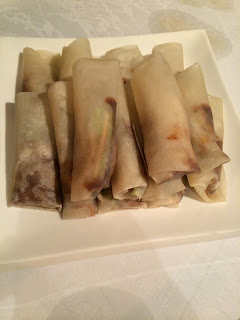 |
| The glorious platter of duck packets |
Flying into Shanghai reminded me of flying into
Chicago. The urban sprawl centers on a few disparately tall spires surrounded
by structures barely knee-high in comparison, fading out to the single-family
homes in the almost imperceptible distance. The crush of people in China is
like rush hour on the DC Metro… except it's like that all the time. A civilized
scooter society has been cultivated, though I don't know whether it's due to
government oversight or too many people already on the sidewalk.
Shanghai is a thoroughly modern city; fast food
chains, 24-hour convenience stores, an efficient subway system, and ubiquitous
coffee shops contribute to an almost Western atmosphere. The superfluously tall
skyscrapers and elevated highway systems project a futuristic veneer over the
area. Meanwhile, open-air fruit and vegetable markets and craft stalls keep the
city grounded in its past. Our hotel was one of the knee-high buildings that
looked incredibly tall, until we compared it to those that truly appeared to
scrape the sky in the city center.
After touring some of the neighborhoods during the
day, we elected to eat in the hotel's authentic Chinese restaurant. Earlier, we
had learned from our guide that typical meals consist of a balance between
dishes. Ergo, when in China, one should order a cold dish, a hot dish, a sweet
dish, a sour dish, a spicy dish, etc. Not wanting to come off like the
Americans the staff must have known we were, we proceeded to try out our new
cultural knowledge.
 |
| Cold beef in a spicy sauce |
We ordered a handful of dishes from crispy pork
belly (hot) to barbecued beef (cold). We even splurged on Peking duck, which
neither of us had tried before. What we failed to take into account was that
the portions were designed for foreigners. In other words, each dish was
essentially an entrée, not a tapas-style serving. When the servers began
bringing the food, my husband and I exchanged nervous glances. The amount of
food in front of us was a decent spread, if we had been a party of four. Still,
like the good Americans we are, we had every intention of cleaning out plates.
 |
| This pork belly had a serious crunch factor |
About halfway through the smorgasbord, the Peking
duck arrived in all its glory. Luckily, it was just the body of the duck; I'm
pretty sure seeing the head still attached would have given me pause about the
dish. Our waitress wheeled the serving cart right up to the table, and used a
large knife to slice thin pieces off the breast. She pulled a small bowl of duck
sauce out from under the cart, followed by a plate topped with a stack of
wonton wrappers and a pile of julienne green onions. She pulled out a pair of
latex glove and proceeded to dip each piece of duck into the barbecue sauce,
place it just so on a wonton wrapper, and top it with three onion slices. Then
she rolled each bite-size packet like a burrito. She created a stack of a dozen
or so packets while we watched her, utterly fascinated. She placed the platter
on the table and left, all without saying a word.
 |
| She was so serious! |
I tried one of the duck packets and immediately
regretted ordering the other food, even the pork belly. The Peking duck was hot,
crispy, and juicy; the sauce was smoky, spicy, and sweet; the onions were cold,
sharp, and fresh; and the wonton wrapper was a little salty. Each of the
elements of the traditional dinner was embodied by these little duck packets. Peking
duck was a perfect representation of the balance our guide had described
earlier in the day. By the end of our dinner, the platter of duck packets was
the only empty dish on the table. Note to self: order the Peking duck first.

No comments:
Post a Comment